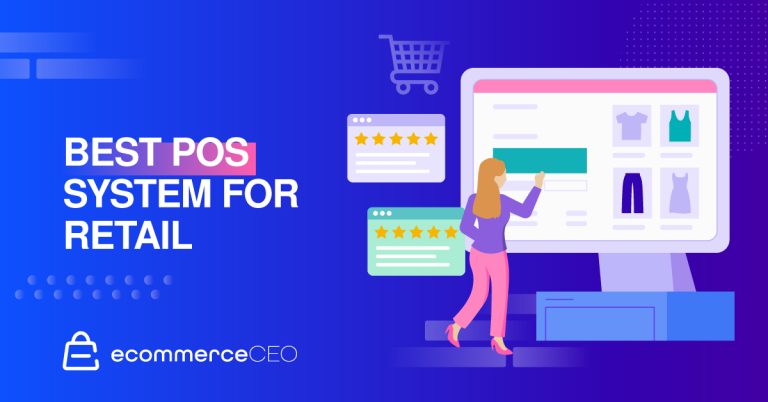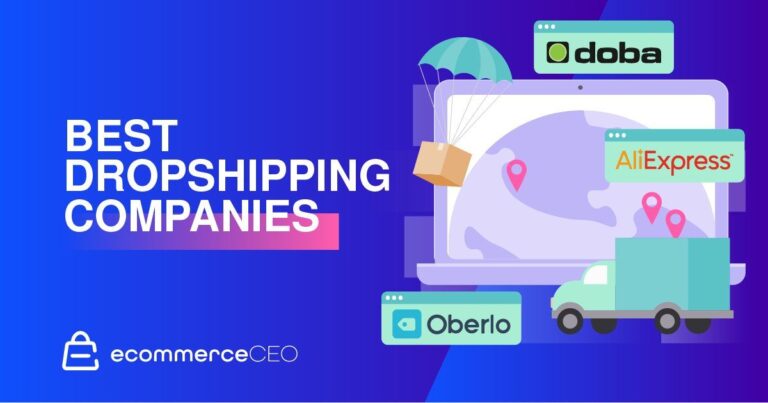In today’s economy, it’s far easier to start an online marketplace than ever before. With multi vendor ecommerce platforms, you can get an online marketplace of your own up and running fairly quickly.
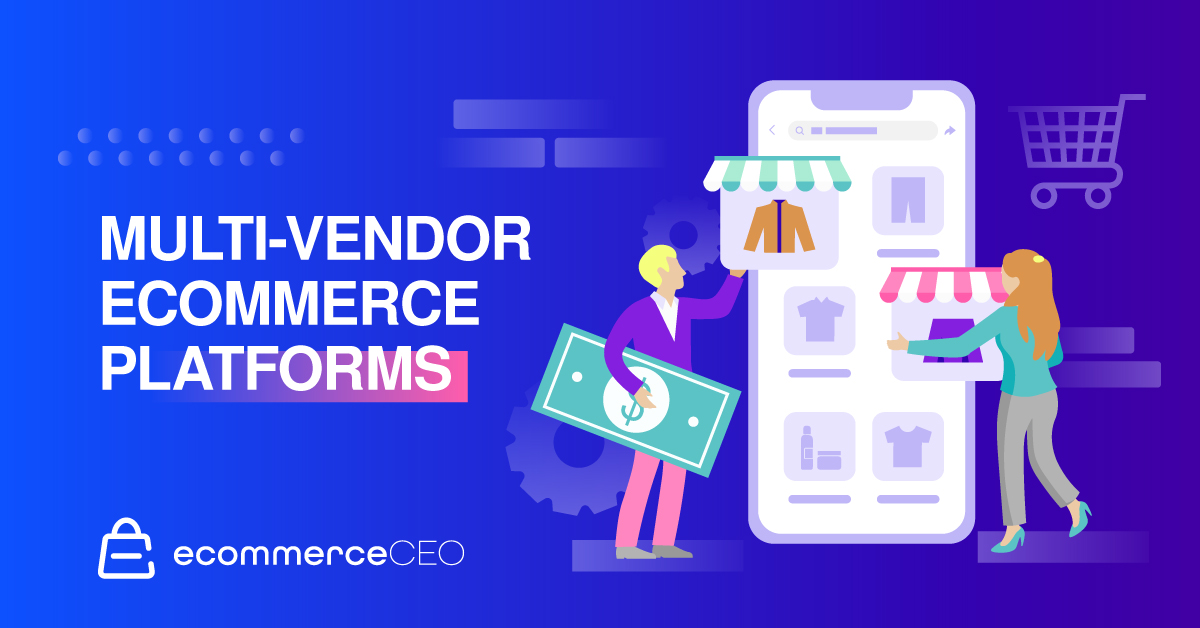
Thanks to these turnkey software solutions, you don’t need to hire a developer to build source code. It includes all the basic features and functions of a traditional multi vendor marketplace, like Amazon, Walmart, or eBay.
If you want to start an ecommerce business of your own using the multi vendor marketplace model, you need multi vendor software to help you. Before we dive into the list of the top 11 options to choose from, we’ll also cover what features to look for.
What is a Multi-Vendor Marketplace?
A multi vendor marketplace is a single website where multiple people can sign up to sell their own products and services. Each vendor has its own storefront with product listings. Whenever someone searches for a product on the site, any vendor who has that product for sale may come up in the results.
Major multi vendor ecommerce marketplaces you’re already aware of and possibly using today include Amazon, Walmart, and eBay. These use the horizontal business model, where multiple vendors are selling a variety of products not specific to any particular niche.

These kinds of multi vendor software solutions also work for the vertical marketplace business model, which focuses on a specific niche. Airbnb, Uber, and Upwork are examples of vertical marketplaces – focused on hotel/lodging, rideshare, and freelancing.
Features to Look for in a Multi-Vendor Ecommerce Platform
As you evaluate multi vendor marketplace software to use for your business, make sure it has the following:
Easy Registration Process
The ideal multi-vendor marketplace platform will support onboarding third-party merchants as sellers. If people have to go through too many hoops to complete the registration process, you will struggle to get merchants to participate in your program. Without merchants, your venture will struggle.
Vendor Portal
Vendors must also have a dedicated portal so they can easily access the information they need to run their store on your platform. Merchants need to be able to manage inventory, price, delivery time, shipping methods, and various other aspects of their business. Your portal needs to provide control over inventory management, discounts, cash on delivery, splitting of orders and payments, and more.
Sellers should also be able to track their earnings through your platform.
Operator Portal
You, as the site’s main operator, must also have a portal that allows you to see a complete list of vendors and their activities on the platform. This is essential for customer service purposes if a customer reaches out to you because of an order gone wrong or poor customer support from the vendor.
Your operator portal should be able to easily administer payments to the sellers, based on the revenue model you’ve selected.
Robust Search Features
If your multi vendor marketplace platform lacks quality search features, customers won’t be able to find what they’re looking for.
Not all search features are created equally. If your search lacks “smart” features, then someone searching for “dog leashes” who types something like “dg leesh” won’t get any results. Your search needs to be able to return “did you mean” kind of suggestions or translate the typo well enough to serve up what the user meant in the first place.

The more granular the search options get, the better – because it makes it super easy for people to zero in on exactly whatever it is they are looking for. People should be able to search via category and narrow down items with a variety of filters like price point, shipping speed, etc.
Variety of Payment Options
Today’s consumers need flexibility in how they pay for products and services. The more options you have available for your vendors to choose to accept, the better.
This improves the overall shopping experience and makes it easier for them to move through the checkout funnel, leading to a decrease in shopping cart abandonment.
Go beyond accepting all major credit cards to offer other payment options like mobile wallets (Google Pay, Apple Pay, Amazon Pay, etc.) and PayPal, Venmo, etc. If you have an international audience, make sure there are multi-currency options with something like WorldPay.
Support for Multiple Revenue Models
When it comes to multi-vendor marketplaces, there are a variety of revenue models you can use. These include:
Freemium: With the freemium approach, there are free and premium features. It is a solid revenue model for businesses who want to reach a substantial user base. The freemium model provides fast lead generation with unlimited access to the platform. Craigslist is the ultimate example of a freemium marketplace because it is free to join and browse and offers additional paid features.
One-Time Join Fee: Using this approach, the seller pays a one-time fee when they register to join the marketplace. The admin receives the sign-up fee every time a new seller registers.
Subscription Fees: Users, either by the buyers or sellers, are charged a recurring fee to access the platform. Amazon uses the subscription model with its Prime membership.
Commission Fees: This is the most popular online marketplace revenue model. Admins charge a fixed percentage or commission fee for every transaction that occurs on the platform. The commission could be charged to the buyer, the seller, or both. Upwork is an online marketplace that charges commission fees to both buyers and sellers – freelancers and the clients they work with on the platform.

Per delivery fees: A per delivery fee is another fee associated with product delivery. Amazon charges delivery fees to non-prime customers and offers free shipping see Prime customers for most of their orders. While many multi-vendor marketplaces charge a delivery fee, the success of the Prime program has created the prime effect where other marketplaces are forced to adapt and offer faster shipping at lower costs if they want to compete.
Selling your own products: At the risk of sounding like a broken record, Amazon does this well. With this approach, you’re using a hybrid model where you and third-party sellers on your Marketplace compete directly with your products. You’ll find many of Amazon’s products listed alongside third-party retailers.
Advertisement Options: With an advertising model, you have a few different options to choose from. You can charge a fee for Featured listings or banner advertisements to generate revenue. You sell advertising to the vendors, giving them a featured listing at the top to increase their visibility on your marketplace. You can also start an affiliate program where you pay a portion of the sale to the person who sends the traffic that converts on your site.
Advanced Reporting Features
Vendors will definitely want to access data about their business, including sales. Making sure you have the data, and visual representations of it available in the back end allows your merchants to get a better understanding of sales trends which allows them to promote their business.
At a minimum, your system needs to provide:
- Data about the top-rated products and the most popular products
- Data to support forecast, such as top search items, the last five orders, etc.
- Instant tracking of abandoned carts and sales
Types of Multi-Vendor Platforms
There are two main types of multi vendor ecommerce marketplaces: self-hosted and hosted. The one that’s right for you depends on multiple factors, such as your budget and your level of comfort with technology.

Open Source (Self-Hosted)
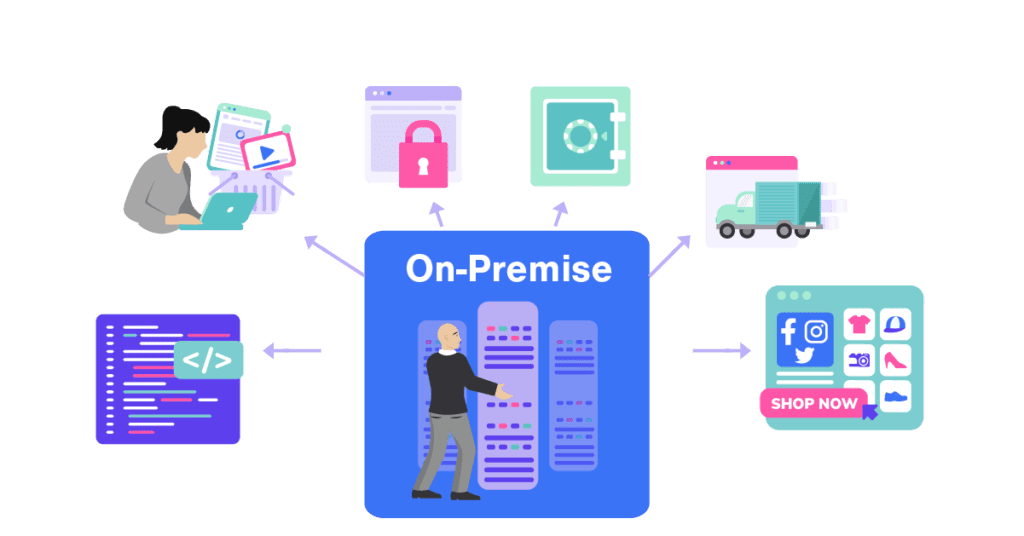
Open-source multi vendor marketplace software is made available for you to use on your own. Open source means that the code is accessible and available for customization if you want to add or change features. Though many open source solutions are available for free, the two are not interchangeable. You may still need to pay a fee for a software license.
It’s up to you to find the right hosting environment for your website. And with that comes maintenance and security requirements. You’re on your own with all of that – and if you don’t have the budget to hire developers – it will be better for you to go with a hosted solution.
Software as a Service (SaaS)
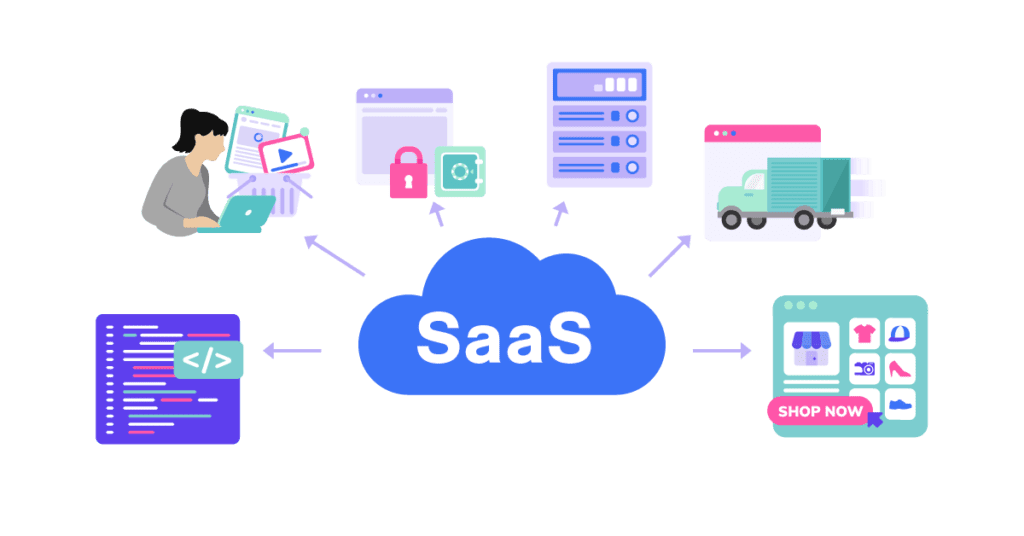
SaaS takes care of all the hosting and everything for you in exchange for a fee. This may be monthly or annually, depending on the terms of your agreement.
You won’t have to worry about hosting, but you don’t have ultimate control over the software, features, and functions.
This is best for people who don’t have much technical skill and who don’t want to deal with the hassle of setup and maintenance.
11 Top Multi-Vendor Ecommerce Platforms
1. BigCommerce Multi-Vendor
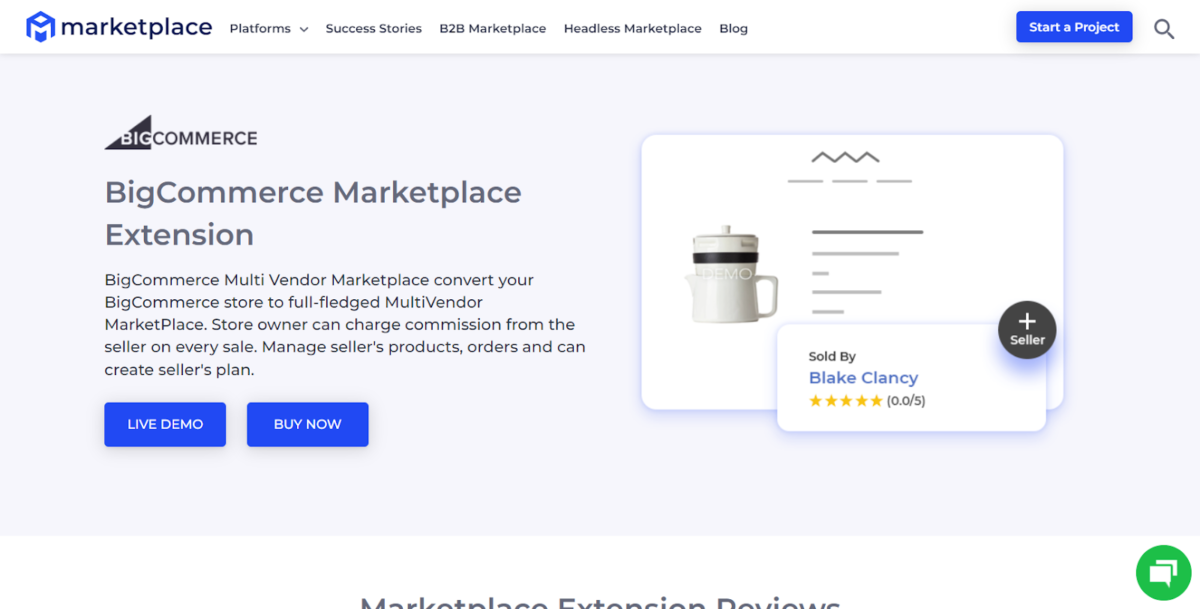
Bigcommerce does not natively support multi-vendor. However, those who are interested can install the Multi-Vendor Marketplace by Webkul app.
With it, you can convert your existing BigCommerce store into a multi vendor marketplace solution. The app has a 10-day free trial and a $10/month recurring fee.
It adds an admin dashboard and seller dashboard, seller subscription plan options, and an easy seller payout process.
2. CS-Cart Multi Vendor
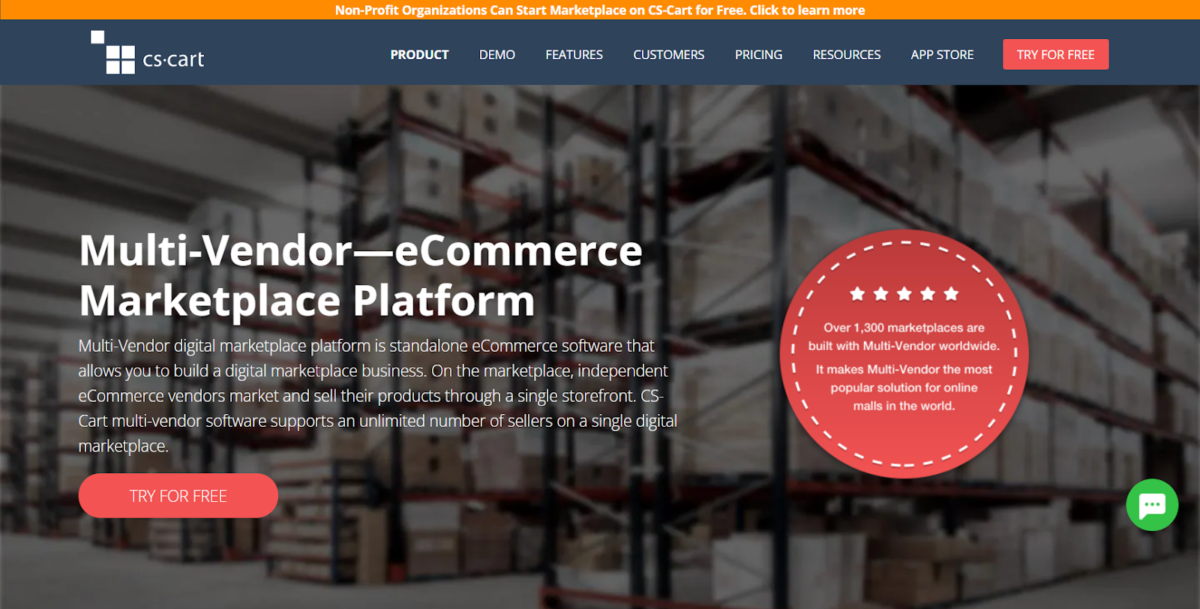
CS-Cart Multi Vendor is a marketplace platform that makes it easy to build your own online mall. More than 1,300 vendors across the world use it. It comes highly rated on platforms like Capterra. It’s worth mentioning that you do not get access to multiple storefronts until you pay for the Ultimate plan or higher.

The one-time fee can be a bit much for businesses just getting started but compared to paying monthly for access to many of the same features, it can be a far better investment in the long run – if you have the technical skills or the budget to hire someone to handle the technology.
All plans come with:
- Lifetime ownership and access to the source code. Enterprise plans get access for the duration of the active subscription.
- 500+ features
- No code UI
- Free bug and security fixes
- 15-day free trial
Pricing:
- Multi-vendor Standard: $1,450 one-time fee
- Multi-vendor Plus: $3,500 one-time fee
- Multi-vendor Ultimate: $7,500 one-time fee
- Enterprise: Custom pricing
The Plus plan comes with 180 days of free upgrades, 90 days of customer care (compared to 45 on the standard plan), and a white label option. For $999/year, you’ll also get access to open source code for a mobile app.
The Plus plan also includes a single mobile application that both vendors and customers can use, along with six additional features for vendor administration and 70+ payment methods for vendors to choose from.
The Ultimate plan comes with one year of free upgrades, 180 days of customer support, and one year of mobile app open source code included ($999/year afterward).
The Ultimate plan includes everything in Plus, along with the option to use multiple storefronts, multiple warehouses, pick-up points for sellers, and the Unitheme conversion-centered design theme.
The Enterprise plan includes a service-level agreement along with a non-disclosure agreement, VIP customer care, a production, and development environment, a high load infrastructure to support fast growth, and access to the repository so that you can be aware of what’s coming up in the platform development.
3. Virto Commerce
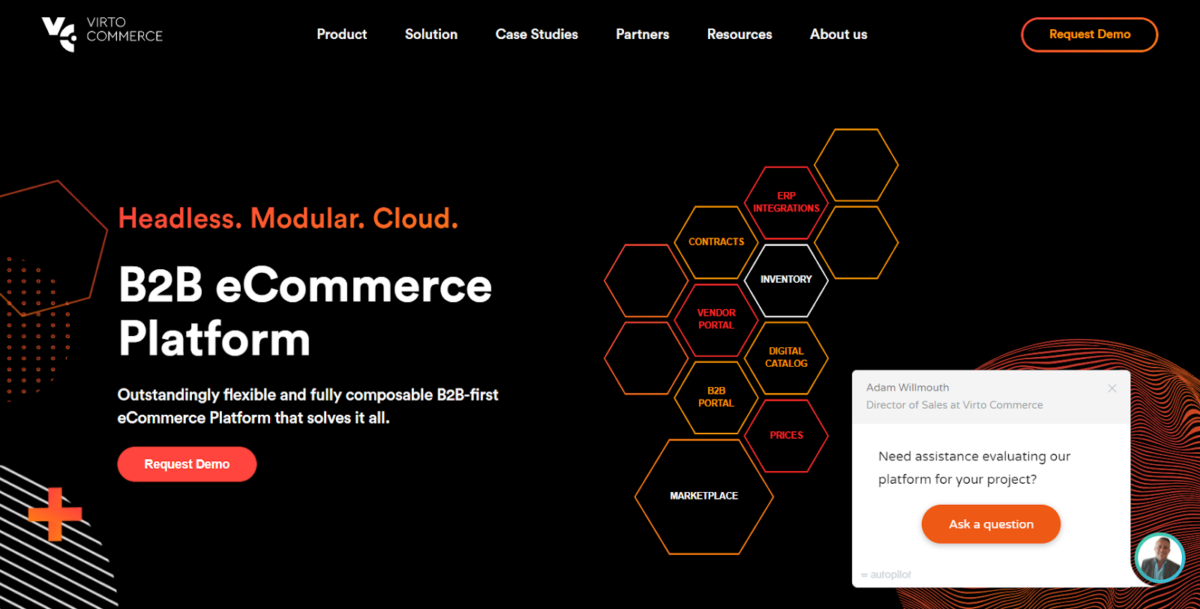
VirtoCommerce powers brands like Volvo, Comcast Xfinity, ProFlowers, Chevron, and HBO. This open-source multi vendor software offers two editions. The Community Edition is ideal for small to mid-sized businesses, and the Enterprise Edition is what large companies should use.

VirtoCommerce offers a robust feature set, including:
- Strong product catalog and management feature: The platform allows for both physical and digital products. No matter how complex your product list is, you can display the information in a way that’s easy for consumers to understand on the front end.
- Marketing and merchandising tools: Including Upselling and cross-selling. The platform uses machine-based learning algorithms to provide product recommendations that are more advanced than what you may find on other platforms. Cart promotions and banners also make it easy for merchants to offer customers personalized deals.
- Solid Order Management: VitroCommerce Takes order management up a notch since it for both payments and shipments to be split. Merchants can also offer quotes when customers need to be specific about the project. It also includes a subscription management feature for easy recurring income.
- Vendor Permissions: This makes it easy for you as an operator to ensure that all of your merchants are following the rules, While still allowing each individual vendor to customize their own store with themes and a complete vendor management profile.
You’ll also get mobile apps with the source code provided, smart search capabilities featuring keyword and attribute searches, extensive customer profiles, data imports, syncs, backups, etc.
It also comes with a few B2B ecommerce features. Beyond the quote pricing feature, it also offers contract base price adjustments for Distributors along with Logistics and backorder support.
Pricing: Free, unless opting for the cloud (hosted) or Enterprise Edition. Pricing is customized to the client and requires contacting the company for more information.
4. Yo!Kart
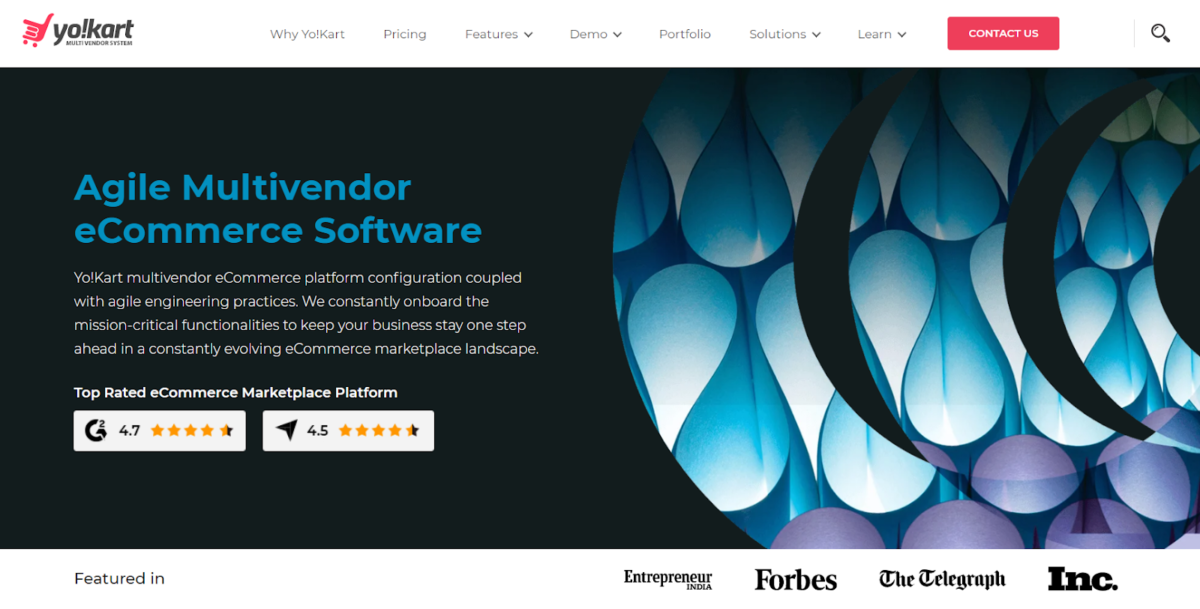
Yo!Kart offers more features than your typical online store builder. It provides strong reporting with real-time tracking so you can keep a close eye on your sales. Periodic reporting is also included to help your merchants keep an eye on market trends and adjust their product offerings.

If you are a beginner, however, you may find Yo!Kart is a bit intimidating. The company will help you install it, but to use it to its full advantage will require some technical knowledge.
Features include:
- Multiple stores for each vendor, if the vendor so chooses
- A real-time shipping cost calculator
- Orders are consolidated and split for shopping carts with products from multiple vendors
- Highly automated SEO
- Easily divide customers into groups based on their buying behavior
- Android app
- Intuitive dashboards for administrators, vendors, buyers, and the front end.
Pricing: $250/year for startups or $999 one-time payment for a lifetime license.
You’ll get the same features regardless of which package you choose. One year of free support is offered.
5. Shuup
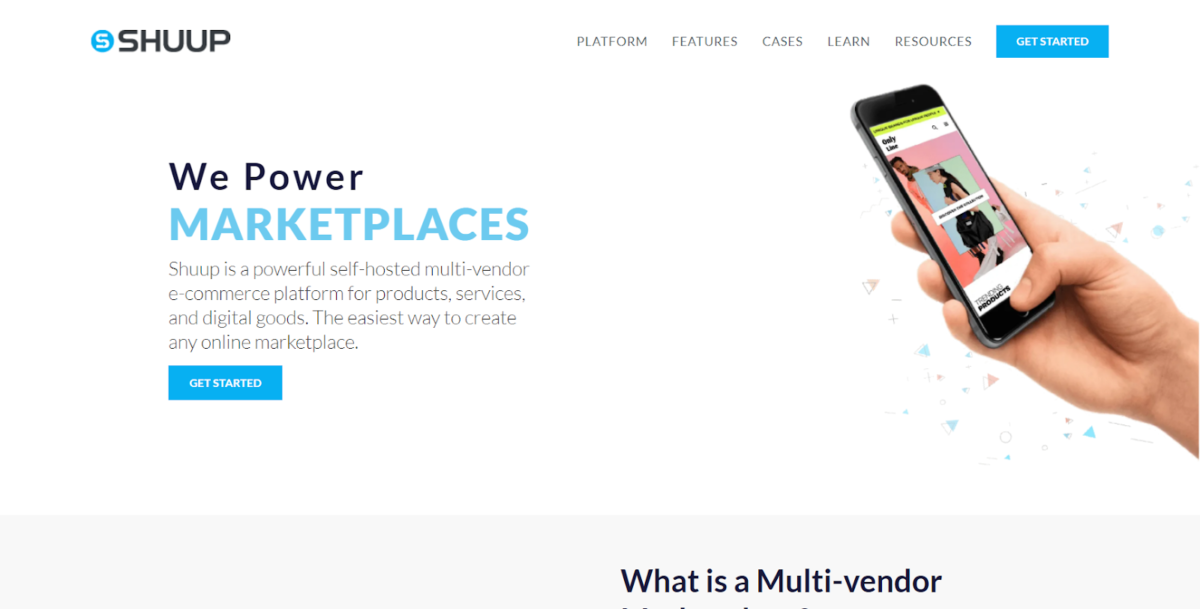
Shuup is a self-hosted multi vendor marketplace platform. Initially launched in 2014 under a different brand name, the company built marketplaces for Fortune 500 companies. The Shuup brand launched to create a more customizable software for a wider variety of companies.
Shuup offers two plans to choose from: Shuup NOW for $299/month plus $100/month for each additional admin user, and Shuup NEXT for Enterprise level customers.
Shuup NOW allows for set up within a few hours, and offers email support with a variety of multi vendor ecommerce features, and supports multiple marketplace types. It is the ideal option for brands looking to launch a proof of concept.
Shuup NEXT is a customized solution that allows access to all Shuup source code that you can host anywhere. It allows you to use your own developers and create proprietary code but is only available to accredited companies only.
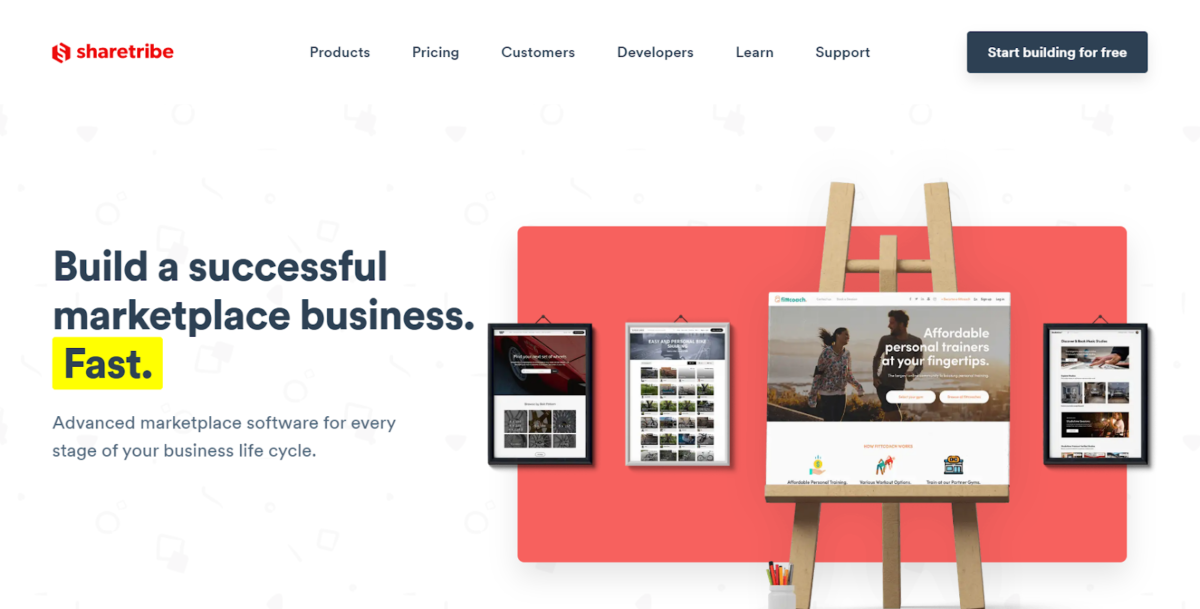
Sharetribe is a hosted multi vendor marketplace solution. They offer two products – Sharetribe Go, and Sharetribe Flex.
Sharetribe Go offers a 30 day trial with no credit card needed, and multiple plans to choose from, based on your business size.

Plans include:
- Hobby ($99/month $79/month when billed semi-annually): 100 users, unlimited traffic, unlimited products and images, unlimited transactions, add your own custom script
- Pro ($149/month $119/month when billed semi-annually): All the hobby plan features, plus 1,000 users, use your own domain, use your own outgoing email address, remove Sharetribe branding, customize the footer
- Growth ($199/month $159/month when billed semi-annually): All the pro plan features, with 10,000 users.
- Scale ($299/month $239/month when billed semi-annually): All the growth plan features with 100,000 users.
Sharetribe Flex is a plan targeted at developers. It is free while you develop your multi vendor store. Monthly fees kick in when your real users start to come in. The fee consists of a subscription fee and a transaction fee based on your monthly transaction volume.
The transaction fee is $0/month with a $30,000 monthly transaction volume. Transaction fees never exceed more than 1%. The subscription fee is $369/month when billed monthly and $299/month when billed annually.
7. Spree
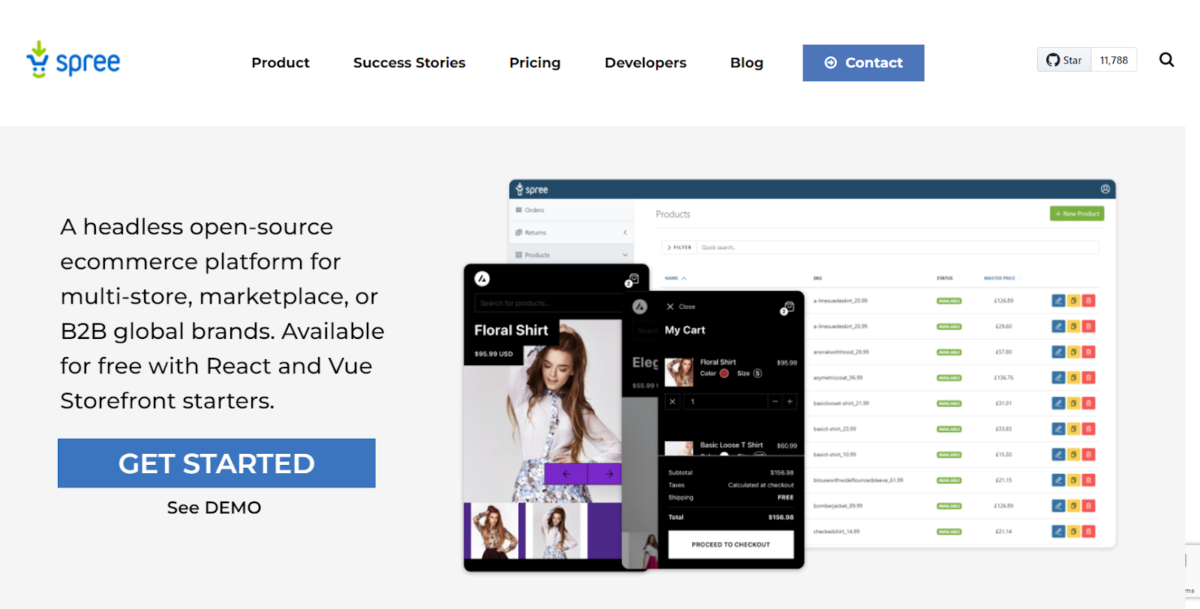
Spree Commerce is a headless open source ecommerce platform you can use for multi vendor marketplace software.
It supports any currency and 45 languages, as well as any payment or shipping method. You can use any third party integration you want, as well.
They also offer Spree as a Service, known as Vendo for those who like the features and functionality but don’t want the technical hassle.
8. Acardier and Acardier Express

Arcadier may be advertised as a no coding platform, but if you purchase the enterprise package, you can customize it completely. The Enterprise package allows you to bring your own developers, or choose one of Acardier’s partners to work with.
If you don’t need something custom, or you just don’t want to spend the resources on it, you can also use one of their many templates or built-in features. That’s where Arcadier Express comes in.

Pricing: Starts at $79/month ($68/month when billed semi-annually or $60/month with annual billing) All plans include a 30-day free trial
Basic Plan: $79/month
- 500 transactions/month
- Unlimited users and listings
- No transaction fees
- No Acardier branding
- Custom domain
- Customizable homepage
- Sub-accounts for sellers
- Analytics and SEO
- Support for multiple languages
- User management
- Email management
- Customizable payments
- Custom code input
- Plug-in Marketplace access
Growth Plan: $199/month
- All of the basic plan, with 2,500 transactions per month and a custom Javascript editor.
Those who need more than what Arcardier Express offers should look into the Acardier Enterprise product, which offers custom pricing and requires you to book a demo.
9. X-Cart Multi-Vendor
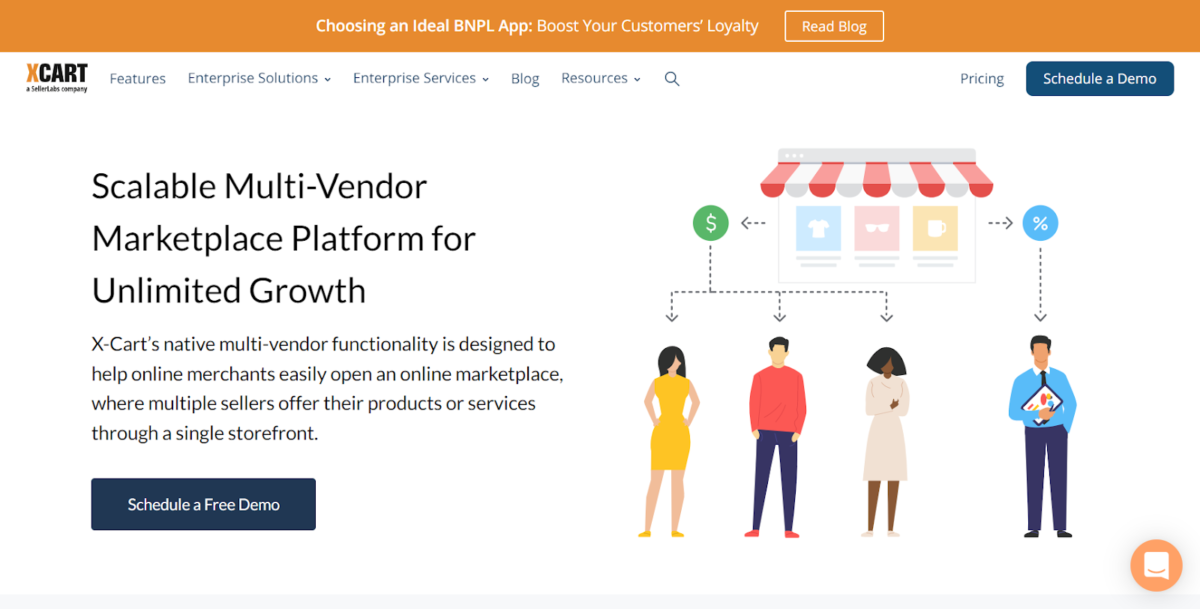
X-Cart Multi-Vendor is designed to support any business model, from online shopping malls with physical products to digital downloadable products, B2B and wholesale, online and offline services, rental and booking systems, and C2C.
While X-Cart pricing starts at $199/month, you’ll need to invest in the Marketplace plan, which starts at $399/month if you want to have a multi vendor platform. To get started, you have to schedule a demo.
10. IXXOCart
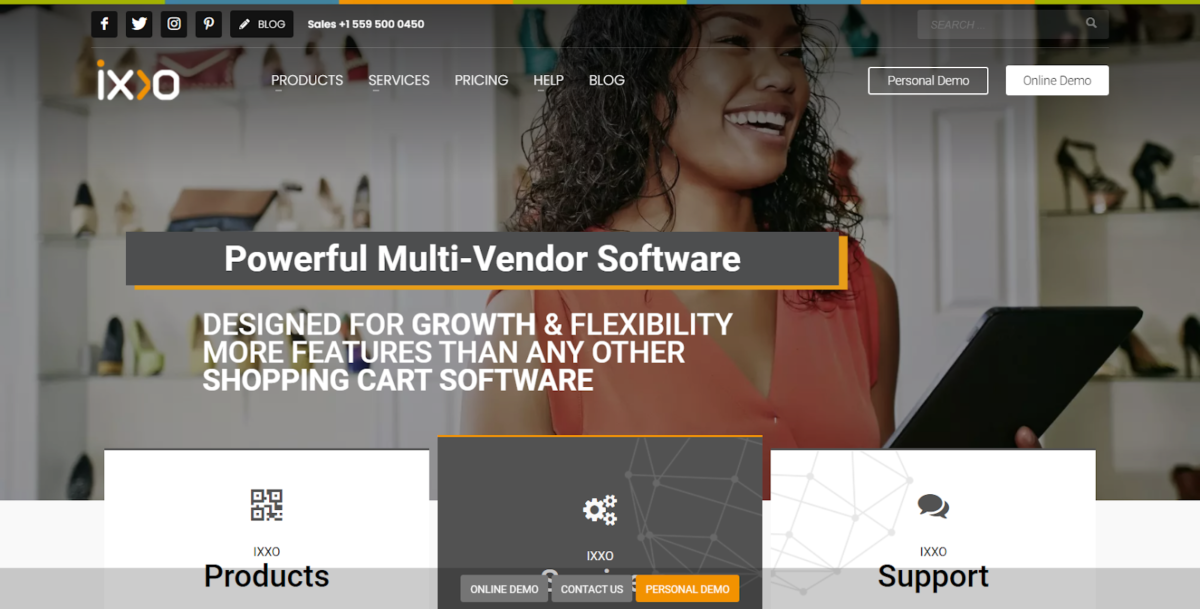
IXXOCart Multi-Vendor offers over 1,000 built-in ecommerce features. It makes it easy for your vendors to personalize their stores but keep them consistent with your overall marketplace design.
You can host an unlimited number of vendors, categories, and products with complete control over all the features of the platform across the back end and the front end. You can use either the IXXO Multi-Vendor standalone product or, if you’re already familiar with WordPress, you can take advantage of the IXXO Multi Vendor plugin for WordPress.
There’s an online demo for you to see how the platform works for customers shopping with your vendors, or for yourself, as a marketplace administrator. Those who are interested in moving forward with the platform can also book a personal demo.
Pricing: Not available on the official website. Book a personal demo to find out more.

11. Shopygen’s Genstore Script
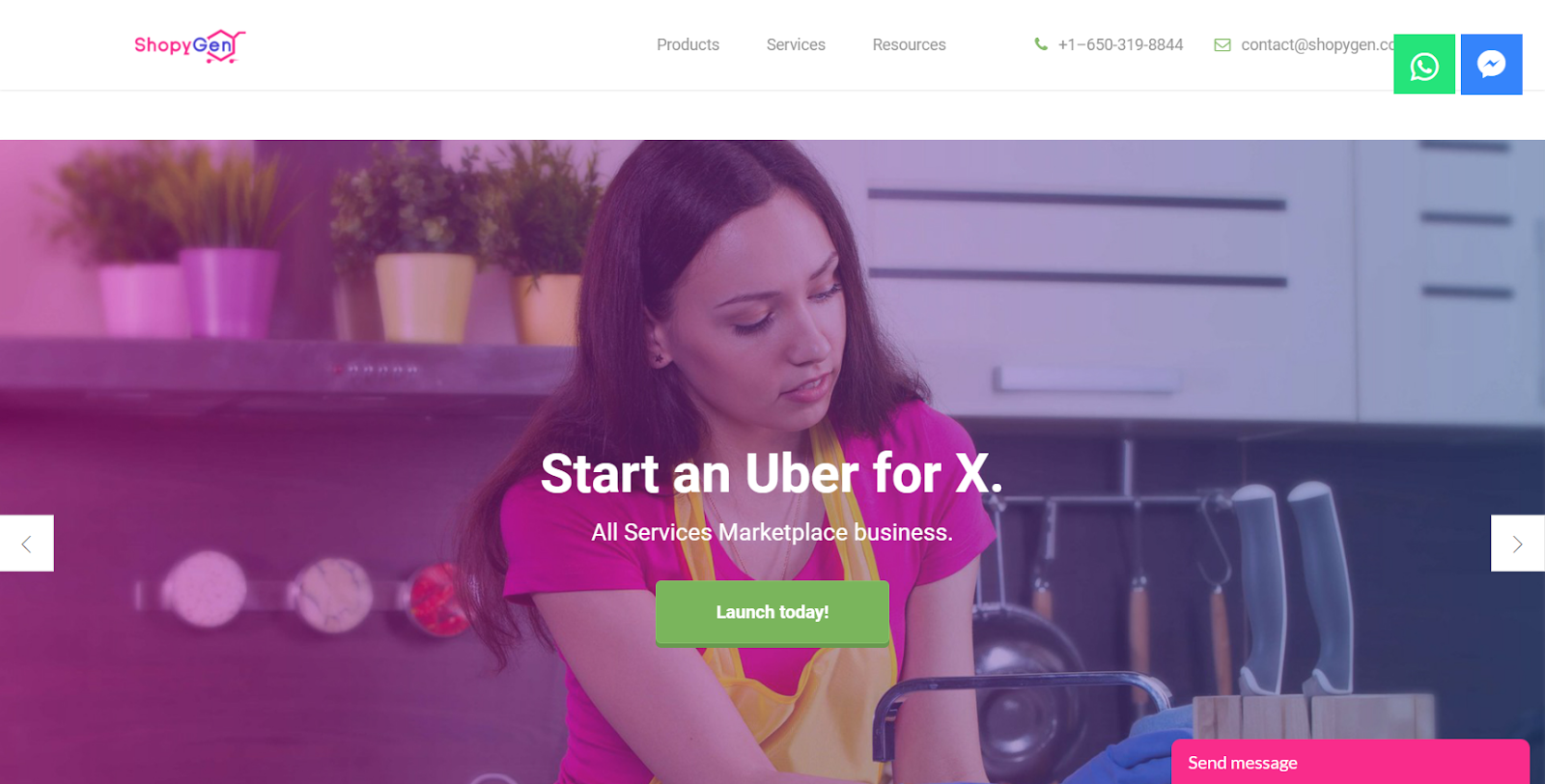
Shopygen’s Genstore Script is a self-hosted multi-seller marketplace option. It requires developers to install and customize. It comes with native Android and native iOS apps – one for users and one for providers. It works with the Stripe payment gateway. It also integrates with Facebook Messenger Bot for customer service.
There are two pricing plans: Standard for $399 one-time and Premium for $999 one-time.
Standard includes 100% source code and IP rights, downloadable web software, no mobile apps, unlimited users and products, SEO friendly, all product features, free expert installation, and one year of support.
The premium plan includes all of this, plus the mobile apps.
FAQs
Start Your Multi-Vendor Ecommerce Business Today
No matter which business models you plan to use with your online marketplace, or what kind of revenue models you intend to employ, the right software is the place to start. These multi vendor marketplace platforms work well for many businesses. As long as you do your research, you’ll be well on your way to a thriving multi vendor marketplace from scratch in no time.




